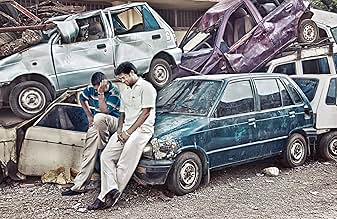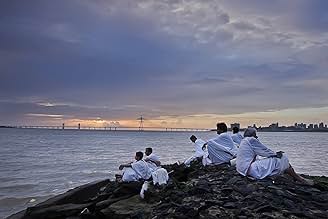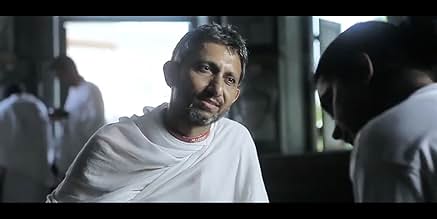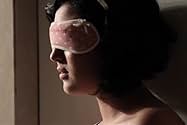Le film explore les questions d'identité, de justice, de beauté, du sens de la vie et de la mort à travers un photographe expérimental, un moine malade et un jeune agent de change.Le film explore les questions d'identité, de justice, de beauté, du sens de la vie et de la mort à travers un photographe expérimental, un moine malade et un jeune agent de change.Le film explore les questions d'identité, de justice, de beauté, du sens de la vie et de la mort à travers un photographe expérimental, un moine malade et un jeune agent de change.
- Récompenses
- 12 victoires et 13 nominations au total
Aydah El-Kashef
- Aliya
- (as Aida El-Kashef)
Yogesh Shah
- Doctor
- (as Dr. Yogesh Shah)
Histoire
Le saviez-vous
- AnecdotesDirector Anand Gandhi uploaded the original film and 6-hour long extra feature online in November, 2013 asking individuals or entities to edit and carve the film as a whole to bring different interpretations. He would later conduct a festival in Mumbai for the entries.
- Gaffes20:50 scene is unreal. Post-op eye opening is done in a dark room so as to prevent strain on eyes.
- ConnexionsFeatured in The Story of Film: A New Generation (2021)
Commentaire à la une
Anand Gandhi's first feature-length film is an intriguing and thought-provoking piece of Independent cinema; it deals with life, purpose and philosophy. Gandhi's prior experience with short films helps him direct the three disparate story lines with certain finesse; the stories shed some light on Theseus's Paradox and give a transcendent look at consequences arising from individual actions.
In Greek Legend, according to Plutarch, Theseus's ship was preserved, and the decayed parts were replaced piece by piece until no part of the original ship remained. Plutarch asks whether you would call it the same ship or not. The paradox might seem too confusing to discuss, but Anand Gandhi just uses this to connect the three plots through the theme of organ donation, questioning identity in the face of change. Rather than making a statement, Gandhi just raises interest and discusses various important philosophies and issues; having compelling arguments for and against the topics, it helps us being a part of the discussion.
The characters are likable and interesting. All the actors have done a commendable job, and Neeraj Kabi's brilliant performance as the Jain monk stands out. As the three stories go, the first one (with the blind Egyptian photographer) deals with behaviour to change, the second one (with the animal-rights supporting Jain monk) might seem more philosophically and intellectually orgasmic, but it's the third one (with a stock broker seeking justice for a kidney scam victim) which oozes with brutal honesty. The use of humour to lighten the serious tone of the movie is delightful.
The cinematography is spectacular. Rarely have I seen such breathtaking visuals in an Independent film; the shots have a certain poetic and aesthetic charm. The blend of far-off shots and sudden close-ups gives us an intimate look at the characters' lives.
The movie is really good, but far from perfection. 2 hours 20 minutes is too long for the movie; with better editing, it could have maintained the pace and momentum well. And as most movies with multiple story lines suffer from this, the characters lack enough depth and screen-time for us to invest ourselves in them. The first story, though the idea of a blind photographer is a bit far-fetched, suffers from an abrupt ending. The second story has many interesting viewpoints and arguments, but part of them seem off-the-book and pretentious; it suffers from an illogical ending too. The third story, though quite honest and absorbing, is quite messy and detours from the main theme of the movie.
From writing screenplay and dialogues for cheesy soap operas to an intellectual independent feature film, Anand Gandhi has come a long way; I guess his experience as a playwright and short-film director must have come in handy.
In Greek Legend, according to Plutarch, Theseus's ship was preserved, and the decayed parts were replaced piece by piece until no part of the original ship remained. Plutarch asks whether you would call it the same ship or not. The paradox might seem too confusing to discuss, but Anand Gandhi just uses this to connect the three plots through the theme of organ donation, questioning identity in the face of change. Rather than making a statement, Gandhi just raises interest and discusses various important philosophies and issues; having compelling arguments for and against the topics, it helps us being a part of the discussion.
The characters are likable and interesting. All the actors have done a commendable job, and Neeraj Kabi's brilliant performance as the Jain monk stands out. As the three stories go, the first one (with the blind Egyptian photographer) deals with behaviour to change, the second one (with the animal-rights supporting Jain monk) might seem more philosophically and intellectually orgasmic, but it's the third one (with a stock broker seeking justice for a kidney scam victim) which oozes with brutal honesty. The use of humour to lighten the serious tone of the movie is delightful.
The cinematography is spectacular. Rarely have I seen such breathtaking visuals in an Independent film; the shots have a certain poetic and aesthetic charm. The blend of far-off shots and sudden close-ups gives us an intimate look at the characters' lives.
The movie is really good, but far from perfection. 2 hours 20 minutes is too long for the movie; with better editing, it could have maintained the pace and momentum well. And as most movies with multiple story lines suffer from this, the characters lack enough depth and screen-time for us to invest ourselves in them. The first story, though the idea of a blind photographer is a bit far-fetched, suffers from an abrupt ending. The second story has many interesting viewpoints and arguments, but part of them seem off-the-book and pretentious; it suffers from an illogical ending too. The third story, though quite honest and absorbing, is quite messy and detours from the main theme of the movie.
From writing screenplay and dialogues for cheesy soap operas to an intellectual independent feature film, Anand Gandhi has come a long way; I guess his experience as a playwright and short-film director must have come in handy.
- akash_sebastian
- 24 juil. 2013
- Permalien
Meilleurs choix
Connectez-vous pour évaluer et suivre la liste de favoris afin de recevoir des recommandations personnalisées
Détails
- Date de sortie
- Pays d’origine
- Site officiel
- Langues
- Aussi connu sous le nom de
- Корабль Тесея
- Lieux de tournage
- Sociétés de production
- Voir plus de crédits d'entreprise sur IMDbPro
Box-office
- Budget
- 12 000 000 ₹ (estimé)
- Durée2 heures 20 minutes
- Couleur
- Rapport de forme
- 2.35 : 1
Contribuer à cette page
Suggérer une modification ou ajouter du contenu manquant

Lacune principale
By what name was Ship of Theseus (2012) officially released in Canada in French?
Répondre





















